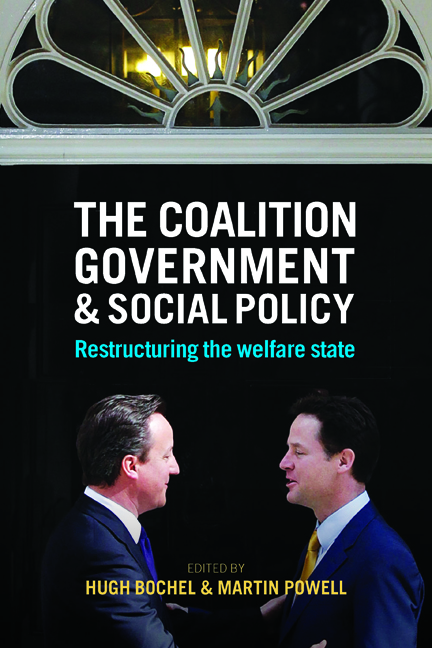Book contents
- Frontmatter
- Contents
- Notes on contributors
- One The transformation of the welfare state? The Conservative–Liberal Democrat coalition government and social policy
- Two The coalition government, public spending and social policy
- Three The changing governance of social policy
- Four The coalition, social policy and public opinion
- Five Health policy and the coalition government
- Six The coalition government, the general election and the policy ratchet in education: a reflection on the ‘ghosts’ of policy past, present and yet to come
- Seven Coalition housing policy in England
- Eight Social security under the coalition and Conservatives: shredding the system for people of working age; privileging pensioners
- Nine Welfare and active labour market policies in the UK: the coalition government approach
- Ten ‘It ain’t what you do, it’s the way that you do it’: adult social care under the coalition
- Eleven Family policy: the Mods and Rockers
- Twelve One step forward, two steps back: children, young people and the Conservative–Liberal Democrat coalition
- Thirteen The coalition and criminal justice
- Fourteen Equalities: the impact of welfare reform and austerity by gender, disability and age
- Fifteen Social policy, the devolved administrations and the UK coalition government
- Sixteen Conclusions
- Index
Six - The coalition government, the general election and the policy ratchet in education: a reflection on the ‘ghosts’ of policy past, present and yet to come
Published online by Cambridge University Press: 01 September 2022
- Frontmatter
- Contents
- Notes on contributors
- One The transformation of the welfare state? The Conservative–Liberal Democrat coalition government and social policy
- Two The coalition government, public spending and social policy
- Three The changing governance of social policy
- Four The coalition, social policy and public opinion
- Five Health policy and the coalition government
- Six The coalition government, the general election and the policy ratchet in education: a reflection on the ‘ghosts’ of policy past, present and yet to come
- Seven Coalition housing policy in England
- Eight Social security under the coalition and Conservatives: shredding the system for people of working age; privileging pensioners
- Nine Welfare and active labour market policies in the UK: the coalition government approach
- Ten ‘It ain’t what you do, it’s the way that you do it’: adult social care under the coalition
- Eleven Family policy: the Mods and Rockers
- Twelve One step forward, two steps back: children, young people and the Conservative–Liberal Democrat coalition
- Thirteen The coalition and criminal justice
- Fourteen Equalities: the impact of welfare reform and austerity by gender, disability and age
- Fifteen Social policy, the devolved administrations and the UK coalition government
- Sixteen Conclusions
- Index
Summary
Introduction
This chapter offers a general overview of the Conservative–Liberal Democrat coalition government's education policy (2010–15) and attends to some specific features and trends. It has not been possible to comment directly on early years, further and higher education as our emphasis here is on the compulsory sector. However, the main trends and emphases with coalition policy were played out in those other sectors in specific ways. We also point to some of the relationships between coalition education policy and that of the Conservative government elected in May 2015 and offer some initial thoughts on the first 100 days of the new government.
One of the key things that we emphasise is continuity and change, that is, how coalition policy both built upon the policies of New Labour and also shifted the rhetorical and discursive problem-space of policy along some different lines. Related to this, we also address some of the continuing tensions within education policy that, while long and fraught, in the current context, can in part be traced back to the ‘landmark’ Conservative education reforms in the 1980s, and the Education Reform Act 1988 in particular.
One way of thinking about continuities and changes is through the notion of the ‘policy ratchet’ (Ball, 2008). This refers to the small and incremental moves whereby certain modes of policy thinking and practice become naturalised and necessary, the ways in which policy is colonised and informed by logical rationalities in which certain discursive and practical possibilities are opened up, embedded and intensified, with the consequence that what may have once seemed impossible or simply unthinkable becomes sensible, obvious and inevitable. This colonisation of thought is not simply epistemological; it is also a material process whereby certain voices and educational purposes are attributed value and legitimacy over and against others, and includes the posing and enactment of particular policy solutions for tackling social problems. These social problems are themselves mediated discursively, and a general election is one ‘event’ where ‘policy windows’ (Kingdon, 1995) are opened for new ideas and new trajectories, but also for further ratcheting. Indeed, the ratcheting of policy is perhaps never more apparent than around the time of a general election, although what was significant this time around was that education was not a key battleground for political positioning and point-scoring, and not a key arena over which the election was fought.
- Type
- Chapter
- Information
- The Coalition Government and Social PolicyRestructuring the Welfare State, pp. 127 - 152Publisher: Bristol University PressPrint publication year: 2016



